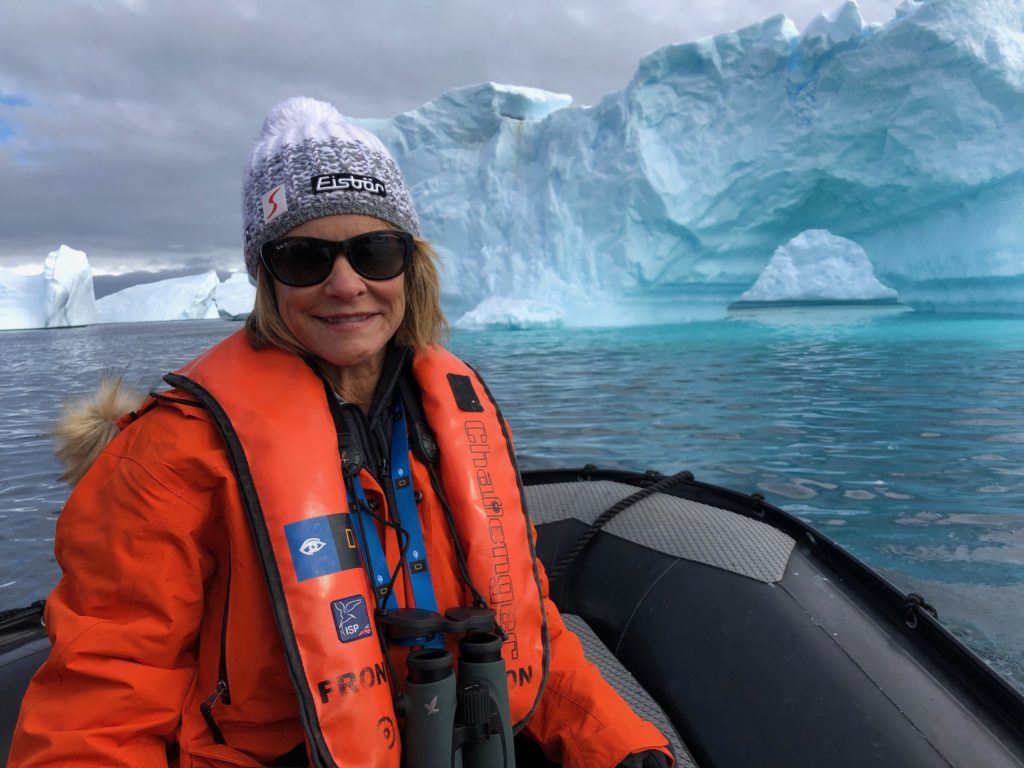I rarely take three weeks off, but for the opportunity to visit our seventh continent on a National Geographic expedition, I made an exception. Antarctica isn’t owned by anyone and answers to an international treaty. No residents live on this ice-covered landmass, paving the way for the most abundant wildlife I’ve ever seen.
We can learn a lot from nature: the way animals adapt to their surroundings and the characteristics they need to survive and thrive in the harshest environment on earth.
Here are some of my takeaways:
#1: A baby penguin’s life depends on the ability of the mother to listen to the sounds of her mate. After giving birth, female penguins travel hundreds of miles to forage, Krill (small fish), stuff themselves full, and return back to their colony and regurgitate their prey to their chicks. While the mother goes to sea to hunt for food, the male protects the baby chick. When she returns two months later, she must find her mate amongst thousands of penguins……..and even to a penguin, they all look alike. So how does she find them? The father’s voice. They listen intently and can pick out their mate’s song amongst thousands of others. They must listen through the noise, be present, and think of nothing else. In return, the male trumpets his song, and the family is reunited.
How well do we listen? Our life may not depend on it, but our sales do. Let’s face it; salespeople don’t hold all the cards anymore. Gartner tells us buyers spend an average of 87 percent of their time researching products and only 17 percent engaging with sellers. As a result, it’s harder for sellers to demonstrate their expertise and build trust. What’s the solution? As my mentor used to say,
[Tweet “People don’t need to understand a product, but they do need to know you understand them and are a trusted, reliable resource. #HeartAndSell”]
One way we demonstrate this is through active listening skills.
Look at the following list and rate yourself on a scale of 1-3 (1 always, 2 sometimes, 3 never) so you know exactly what skills you need to work on this year.
- How well do we listen to the cries of your team members and the needs of your clients?
- Do you focus your complete attention on your prospect?
- Is your concentration so intense that you capture both content and intent?
- Do you refrain from prejudging or rejecting what you hear?
- Are you are so engaged that you feel an emotional shift as someone shares information, ideas, and beliefs with you even when they’re different than your own?
- Do you think about what you want to say next, or do you let prospects share their whole story?
- Do you listen to the concerns of other stakeholders involved in making decisions?
- Do you repeat back what you hear and gain confirmation that you’ve gotten the whole story?
#2: Humpback whales, it turns out, deliberately interfere with attacking killer whales to help others in distress. They don’t just defend their own babies or close relatives. They intervene on behalf of other species—you may even call this compassion. Research shows, the happiness we derive when we act on behalf of the greater good shows up in our cells as a better immune response profile, at a cellular level. Happiness derived from meaningful service to others is correlated with positive health benefits.
How compassionate are we?
One of the reasons sellers suffer is precisely because the purpose of our struggle is unclear. What are you working toward? Identify your core motivation: your real purpose. Are you working for your children, security in retirement, or perhaps to support your spouse? When your purpose is bigger than you AND aligns with your talent, you have the best chance for success.
#3: Seals and ocean lifehave evolved an adaptation to survive the polar climate. The water temperature is the coldest on the planet, and as a result, many ocean animals have adapted by producing a protein that prevents their blood from freezing.
[Tweet “The only competitive advantage we have today is our ability to help customers. #HeartAndSell”]
How well have you adapted to the changing consumer? Gartner also tells us customers today are not just overloaded with information but are overloaded with conflicting information. The only competitive advantage we have today is our ability to help customers:
- Sort through all of the information they already have
- Prioritize it
- Make sense of it
- Ask questions they didn’t know to ask
- Teach them the criteria for effective decision making.
A new discovery question we recommend ALL B2B and B2C sellers ask in 2020 is this:
As you start the new year, remember what you can learn from the natural world. The world of sales is wild, ever-changing, and, at times, harsh. But In the words of Hemmingway, “The world breaks everyone, and afterward many are strong at the broken places.”
Be more-sell more.

